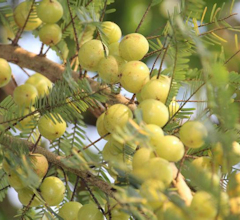Amalaki
 Amalaki (Emblica Officinalis), also called Amla or Indian Gooseberry, is native to India. It has a special place in Indian traditional Ayurvedic medicine. It is a medium-sized fruit-bearing tree that is common in South Asia but also grown in Central Asia and China.1
Amalaki (Emblica Officinalis), also called Amla or Indian Gooseberry, is native to India. It has a special place in Indian traditional Ayurvedic medicine. It is a medium-sized fruit-bearing tree that is common in South Asia but also grown in Central Asia and China.1
Its fleshy fruit, or its extract, is mostly used to manage various health conditions. It is a good source of nutrition, dietary fibre, minerals, Vitamin C and antioxidants. However, it is more commonly used for its content of beneficial phytocompounds. It is rich in nicotinic acid, phyllemblin, gallic acid, quercetin, ellagic acids and pectin. In India, it is common practice to use its oil. Outside India, people would usually consume its dry powdered extract.1
Health Benefits of Amalaki
Below are some of the well-known benefits of Amalaki:
- Heartburn
Gastro-esophageal reflux disease (GERD) is a common problem causing heartburn. Studies show that Amalaki extract used 500mg twice daily can be pretty good for managing GERD symptoms.2 - Antioxidant
Amalaki is moderately rich in Vitamin C but also contains other Vitamin E like compounds and phenolic compounds, which may explain its excellent antioxidant capacity. It may help in various chronic disorders, including diabetes.3 - Heart Health
There appear to be at least two known mechanisms in which Amalaki may help boost heart health. Firstly, studies show that it has considerable ability to lower cholesterol levels, especially triglycerides. It also reduces inflammatory markers along with cholesterol. Secondly, studies show that it may help improve cardiac contractibility and therefore boost exercise tolerance.4,5 - Brain Health
Some initial studies show that Amalaki is quite suitable for brain health. In one of the experimental studies, researchers found that Amalaki can help slow down neurodegeneration. Therefore, it may facilitate healthy aging and prevent cognitive decline. It may also have a role in slowing down the progress of dementia.6 - Anti-Stress
Amalaki also helps counter stress and prevent stress-related disorders. It could be due to various reasons, including its high content of antioxidants. Nevertheless, experimental studies have found that using Amalaki may improve lifespan.7 - Anti-Aging Properties
Amalaki also appears to prolong lifespan. This mechanism of action seems to be independent of its antioxidant activity. Researchers now know that aging is characterized by increased DNA damage, and more importantly, reduced telomerase activity. One of the studies in healthy individuals aged 45 to 60 years found that 45 days of Amalaki intake could increase telomerase activity, ultimately contributing to healthy aging. Further studies demonstrated that it may help protect DNA and prevent its damage due to toxins. Its ability to prevent DNA damage could be another way in which using Almalaki can help to prolong lifespan.8,9
Additionally, it is worth noting that Amalaki oil is also quite popular in India and is thought to help prevent hair loss and is suitable for skin health.1
Side Effects of Amalaki
Amalaki appears to be well tolerated by the body. There are no known severe side effects of its extract. It may cause minor gastric issues, bloating, or allergies in some. However, it is worth noting that there are no safety studies regarding its prolonged use or its interaction with other foods and medications.
Properties
- Adaptogen3,6,7
- Anti-Aging8,9
- Anti-Fungal1
- Anti-Nausea2
- Anti-Stress7
- Antimicrobial1
- Antiviral1
- Anxiety7
- Astringent1
- Bladder Support1
- Blood Pressure – Reduction4,5
- Blood Tonic4,5
- Brain Function / Neuroprotective6
- Breathing Difficulties1
- Cancer Prevention3,8,9
- Cardiovascular Support4,5
- Crohn’s Disease2,3
- Cystitis3
- Digestive Function1
- Enhances Endurance1
- Expectorant1,7
- Fatigue1,7
- Galactagogue (Increases Mothers’ Milk) 1
- Gall Bladder Support1,2
- Gall Stones1,2
- Haemorrhoids1
- Heart Support / Health4,5
- High/Good Levels of Omega-3 Fatty Acids1
- High/Good Levels of Phytochemicals / Phytocompounds1
- High/Good Levels of Vitamin C1
- High/Good Levels of Vitamin E1
- Kidney Support1
- Laxative1
- Nausea2
- Nervine6
- Sedative7
- Sexually Transmitted Diseases1
- Wound Healing1
References:
- Bhat P, Umale H, Lahankar M. Amalaki: A review on functional and pharmacological properties. 2019;8:4378-4382.
- Karkon Varnosfaderani S, Hashem-Dabaghian F, Amin G, et al. Efficacy and safety of Amla (Phyllanthus emblica L.) in non-erosive reflux disease: a double-blind, randomized, placebo-controlled clinical trial. J Integr Med. 2018;16(2):126-131. doi:10.1016/j.joim.2018.02.008
- Shukla V, Vashistha M, Singh SN. Evaluation of antioxidant profile and activity of amalaki (Emblica officinalis), spirulina and wheat grass. Indian J Clin Biochem. 2009;24(1):70-75. doi:10.1007/s12291-009-0012-3
- Upadya H, Prabhu S, Prasad A, Subramanian D, Gupta S, Goel A. A randomized, double blind, placebo controlled, multicenter clinical trial to assess the efficacy and safety of Emblica officinalis extract in patients with dyslipidemia. BMC Complement Altern Med. 2019;19(1):27. doi:10.1186/s12906-019-2430-y
- Kumar V, Aneesh kumar A, Kshemada K, et al. Amalaki rasayana, a traditional Indian drug enhances cardiac mitochondrial and contractile functions and improves cardiac function in rats with hypertrophy. Sci Rep. 2017;7(1):8588. doi:10.1038/s41598-017-09225-x
- Dwivedi V, Tripathi BK, Mutsuddi M, Lakhotia SC. Ayurvedic Amalaki Rasayana and Rasa-Sindoor suppress neurodegeneration in fly models of Huntington’s and Alzheimer’s diseases. Curr Sci. 2013;105(12):1711-1723.
- Dwivedi V, Lakhotia SC. Ayurvedic Amalaki Rasayana promotes improved stress tolerance and thus has anti-aging effects in Drosophila melanogaster. J Biosci. 2016;41(4):697-711. doi:10.1007/s12038-016-9641-x
- Guruprasad KP, Dash S, Shivakumar MB, et al. Influence of Amalaki Rasayana on telomerase activity and telomere length in human blood mononuclear cells. J Ayurveda Integr Med. 2017;8(2):105-112. doi:10.1016/j.jaim.2017.01.007
- Vishwanatha U, Guruprasad KP, Gopinath PM, et al. Effect of Amalaki rasayana on DNA damage and repair in randomized aged human individuals. J Ethnopharmacol. 2016;191:387-397. doi:10.1016/j.jep.2016.06.062
